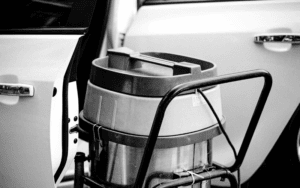Sometimes the best cleaning tools just won’t cut it if you don’t use the right chemicals. Store-bought chemical cleaners can sparkle up your apartment but they aren’t the best for the environment. And let’s not forget how window, floor, sink cleaners, etc increase our shopping bill. Cleaning should never be an expensive ordeal which is why we want to discuss how to turn something as basic as vinegar and baking soda into multipurpose cleaning machines!
Check Out These 9 Vinegar and Baking Soda Cleaning Hacks
Vinegar
Vinegar is typically used as a condiment or for pickling vegetables. But let’s not forget vinegar is an acid which makes it an excellent natural cleaner. Here are some ways you can use vinegar:
1. To clean the shower

Sometimes the water from the shower overhead falls in all directions except downwards. This happens when there is a hard water buildup on the shower outlets, forming a hard crust. The water flows in all directions because it is not able to cut through the crust. But don’t worry, cleaning the crust is super easy.
Take a plastic bag, sturdy enough to hold vinegar and your shower head; make sure the bag does not have any holes. Pour in the vinegar into the bag, with the shower head, and let it sit for at least a few hours. After a few hours, remove the shower head and clean it under running water. You can use a toothbrush and soap to remove any other dirt and debris from the shower head and it will be as good as new.
2. Laundry Booster
Vinegar also helps to make your laundry detergent work better. You can either add it in the detergent chamber in the washing machine or sprinkle it from the top. Let the washing machine run as usual.
The vinegar lightens and brightens your clothes. If you have any funky-smelling fabrics, well the vinegar kicks it right to the curb!

3. Kitchen Countertop Cleaner
Vinegar is an excellent countertop cleaner. It is natural so it doesn’t add harmful chemicals to the place you make food and the acids do a decent job at removing any contaminants. Mix 2 parts vinegar and 1 part water and scrub the kitchen counter as you would regularly. If you have trouble removing stains on the counter, you can add a drop of dish soap to the mixture and mix it in before scrubbing the stains.
Vinegar also manages odor so you can rest assured that your counters will smell clean after this quick scrub.
4. Glass Cleaner
Vinegar makes for an excellent eco-friendly glass cleaner. Combine 1 part vinegar with 2 parts water in a spray dispenser, or add it directly to your glass cleaner tool, if the model allows it, and start cleaning as you would otherwise. This concoction will make your windows shine and prevent cobwebs for the next few days.
5. Insect Repellent
Vinegar works well against mosquitoes and certain garden mites. Mix 1 part warm water with 1 part vinegar, add a handful of cloves into a spray bottle. This is your ready-to-use insect repellent.
You can use it on the nooks and crannies and even on house plants. Be careful not to spray too much on the leaves. Shake well before using. I would suggest making this in smaller quantities because the effectiveness of the cloves will reduce over time.
Baking Soda

Baking soda is the opposite of vinegar, in the sense that it is a base. Its alkaline nature makes it work like a soap and effectively removes stains and grime from surfaces. However, it does not work as a disinfectant. So, many home cleaners use baking soda and vinegar together to turn it into an effective anti-bacterial cleaning solution
Here are some ways you can use baking soda:
1. Wall Cleaner (Dry)
Sprinkle baking soda on a dry container, dab it with a sponge, and rub it onto the dirt on the wall. Once you are done rubbing on the dirt, use a clean cloth to remove all the baking soda and debris. Your wall will be as good as new.
Baking soda works great on white walls but may sometimes remove the dye on colored walls. So, make sure you do spot testing – or use the baking soda in a less visible part of the wall to ensure the dye is safe before tackling the mess at hand.
2. Stainless Steel Cleaner
Baking soda works well on stainless steel utensils. If you want to clean a big pot or pan, you can coat the insides with baking soda, add hot water, and let it soak overnight. This method saves you from scrubbing the utensils and causing scratches.
If you want to clean stainless steel cutlery, you can add the cutlery to a steel vessel that also needs cleaning and follow the steps mentioned above. There’s nothing better than getting many things cleaned at once!
3. Bathroom Scrub

Baking soda also works well as a bathroom scrubber. Simply take equal parts baking soda and dishwasher soap and mix. You can add a little bit of water if required but make sure the mixture has a paste-like consistency. If the mixture has too much water, it will lose its strength to clean. Apply the mixture on the sink, bathtub or tiles and give it a good scrub. Leave the mixture on for some time and rinse with water.
The baking soda and the dishwasher liquid together form a stain-removing anti-bacterial formula. Since bathtubs and sinks are made of ceramics, you should never use vinegar on these surfaces. Although natural, it does react with stone causing it to lose its shine over time.
Vinegar & Baking Soda
1. Fabric Softener
If your towels or clothes are getting hard and crinkly this hack will make your fabrics as good as new. Wash the towel in the washing machine in 2 cycles. In the first cycle, use hot water and a cup of white vinegar; in the second cycle, use hot water and 1 cup of baking soda. Your towels will come out soft and smelling great!
Conclusion
So here are some vinegar and baking soda cleaning hacks that will keep your home clean without making a hole in your pocket. But what we love the most about these cleaning hacks is their environmental impact. While store-bought products are great for severe stains and fungal spots, they should be used in moderation to reduce the effect it has on the environment.
Knowing these hacks can do two things: it limits the number of commercial cleaning solutions and increases the longevity of store-bought solutions as you would require them less often. Don’t get me wrong – commercial cleaners are great! But we don’t need 100s of them. Simple homemade solutions help us recognize essential cleaning solutions from nonessential ones.
With baking soda and vinegar, we need to know what they react with. As long as we use them on non-reactive surfaces we can keep our homes clean and smelling fresh without harming the environment.

















